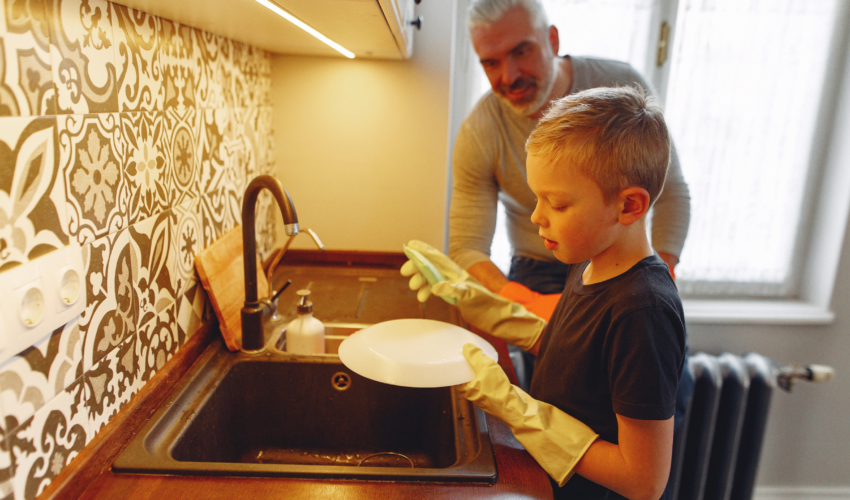The holidays are just around the corner, and whether or not you’re hosting the holidays in your home, the last thing you want to worry about is a plumbing problem.
After all, so many of us are staying closer to home these days. That means there’s more pressure on your plumbing. Fortunately, there are ways to help your pipes perform and keep doing their job smoothly.
Read on to learn how to prevent pre-holiday plumbing issues.
You Put What Into the Garbage Disposal?
- The in-sink garbage disposal is a great way to safely dispose of food waste, lightening the load in our landfills and making your life easier. This tiny-but-mighty appliance can keep grinding away for years — if you treat it with kindness. While your garbage disposal’s blades may seem tough enough to grind anything into bits, there are a few items that should never go down the drain.
- Cooking grease: Grease is a top culprit in all kinds of plumbing problems, including disposal issues. Contrary to popular opinion, running a disposal — even with hot water — doesn’t break down grease. This sticky substance still coats pipes like glue; over time, it builds up, narrows pipe diameters, and leads to clogs. We just can’t say it strongly enough: Keep all grease and cooking oil out of the drain.
- Bones: Disposal blades may be strong, but they’re simply not that strong. Bones are tough, and they both wear down your blades and have the potential to cause clogs.
Coffee grounds: Some folks throw grounds down the disposal in an attempt to reduce odors. Unfortunately, wet coffee grounds compact into a thick, dense paste, which can cause long-term problems in your pipes. - Pasta and dried grains: Pasta, oatmeal, rice, quinoa, and other dried grains have something in common: They expand when they absorb water. So while your disposal may grind them into little bits, these pieces will expand as they go down the pipes, leading to potential clogs.
- Nuts: Disposals can easily grind nuts… but that’s actually the problem. When ground, nuts turn into nut butter, a sticky, thick substance that can build up inside the pipes.
Onion skins and eggshells: Both onions and eggs have a thin, strong membrane beneath their outer surface. Often, this membrane can escape disposal blades and lodge further down in the drain, where it acts as a net to collect other debris. - Harsh chemicals: While dish soap and other standard kitchen cleaners are OK, harsh chemicals aren’t. The drain de-cloggers you buy at the store can damage your blades and the drain line. Instead, use ice cubes and salt to keep your disposal clean, and call the professionals to safely clear clogs.
Avoid the Dreaded Toilet Clog
If the thought of a backed up toilet gives you a little bit of anxiety, you’re certainly not alone. After all, it’s not exactly fun to clean up.
Fortunately, toilet clogs are relatively easy to prevent. There’s really no delicate way to say this, so we’re just going to lay it out: Only flush the three P’s, which are(toilet) paper, pee, and poo.
Nothing else should ever go into the toilet. That includes facial tissues, hygiene products, hair and — contrary to common wisdom — wipes. All wipes should go in the trash, even those that say “flushable” on the label. They simply don’t dissolve quickly enough and can cause pipe problems down the line.
If you do end up with a clog, a flange plunger can be your best friend. If you’ve got constant backup problems, leaks or a constantly running toilet, it’s time to call in the pros.
Stop Clogs Before They Start
Prevention can go a long way toward solving plumbing issues, especially when it comes to clogs. Installing simple mesh drain screens on showers, bathtubs and sinks can help catch most debris before it goes down. Screens are especially effective at stopping one of the worst culprits: Hair.
In the laundry room, install a lint catcher in your washing machine hose. This easy step prevents lint from going down the drain.
Along with screens, cleaning drains regularly helps prevent buildup. About once a month, sprinkle a handful of baking soda around the drain, following by enough hot water to get the powder into the drain. Then pour a cup of white vinegar in and let it all sit for a few hours or even overnight. Finally, flush the drain with hot water.
While many plumbing issues are preventable, sometimes you simply need to call in professionals. Fixing leaky pipes and faucets while the problem is still small can prevent larger issues down the line.
North East Air Conditioning and Plumbing has been taking care of plumbing needs in and around San Antonio since 1971. Contact us when you need plumbing or HVAC help.


